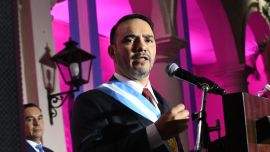I only needed to load up my tickets via the Previaje app to be in for a double surprise. Firstly, due to the efficiency of the procedure, which within a few minutes had confirmed a credit of 200,000 pesos. When giving away money the Argentine state achieves a Scandinavian efficiency. Secondly, because I’m left with no other conclusion than that Argentina is a country which has lost its mind.
I still have a signed San Lorenzo shirt which From Tourism & Sports Minister Matías Lammens gifted me when, after arduous negotiations, we hammered out the conditions whereby the club could use the Banco Ciudad logo. I cannot recognise in that cash-strapped businessman the man who says: “Previaje is a tremendous success” and that “Previaje is the most important policy in the history of tourism” or who was overcome with emotion at a rally when recalling that this policy “is an enormous [source of] pride as the brainchild of a team of professionals working at the Ministry with the vocation of adding value to the country.”
All this is a curious definition of success. If we use fiscal resources to pay half of something, we should not be surprised if people ask for that 50 percent – everybody likes the idea of somebody else footing their bills. This is a policy which, in reality, could apply to anything. For example, we could suggest that the state pay half the car price or half of what we spend on beef or milk. Lammens could then say (and nor would he be wrong) that this is a clearcut personal success because, given that public funds could be used to pay for anything, only he could convince the government to play Father Christmas within his area. But one thing is Lammens and another the general interest so, until we throw onto the scales the fact that those funds could have been used for other and perhaps more necessary aims rather than this programme, it becomes difficult to conclude that it is a political success.
Economists generally reason on the basis of marginal cost-benefit analysis. The economist would say: look for the most wasteful expenditure and then for the most burdensome tax. If the yield from that spending is less than the cost of that tax, you have to cut back on the least beneficial spending and reduce the most burdensome taxes, carrying on along those lines until reaching the point where the benefits from the spending compensate for the cost of the tax. Within a government it is the task of the economy minister to order the multiple demands of the different sectors in order to comply with rational criteria. If these are not respected, the success of Lammens signifies the failure of his Economy Ministry colleague Martín Guzmán.
Transferring this to our example, it would be worth comparing the social benefit of saving the Sturzenegger family 200,000 pesos from their holidays with the greater cost which could have been avoided if that revenue did not need to be raised.
The first thing we need to keep clear is that somebody has to pay those 200,000 pesos. There is no Santa Claus with his army of little helpers and Christmas elves giving presents without cost. Argentina’s debt is currently around US$200 billion, which is only three percent of the last 50 years of public spending at all three levels at net present value. In other words, 97 percent of spending has been paid by taxation (or by printing money, which is an inflationary tax). Some might argue that the spending “pays itself” because public spending supposedly expands activity and generates fresh revenues but the evidence shows that the effect of public spending on activity is zero. Conclusion: somebody pays for whatever the state spends.
So what is the cost of this edition of Previaje? It is hard to tell how much it will end up costing. But if half the over 70 billion pesos already registered (with still a few days to go before the deadline) are paid, we can comfortably estimate the expenditure at around 30 billion pesos at least. The question then becomes: What taxes might we lower with 30 billion pesos?
A good way of envisaging those taxes is how they end up reducing the income from the factors of production. It is not true that taxes make production unviable, as is sometimes said, what they do is to oblige an employer to pay less to the factors of production contracted, mainly the workforce. Employer contributions, for example, end up generating less income for workers.
Social security contributions represent 17 percent of gross income, implying that take-home pay could grow 20 percent if those contributions were eliminated. An intuitive way of envisaging where those taxes hurt most would be to think of the lowest-paid formally employed workers. And here comes the surprising part. If we were to use the 30 billion pesos of Previaje to reduce those contributions, we could eliminate them for half of the lower-paid population. It would be a direct blow against the poverty which supposedly worries us so much, thus boosting formal employment.
Lammens might call Previaje a success for his Ministry but his Social Development and Economy colleagues would be hard placed to see this spending as an efficient use of resources. In reality – and let us say this loud and clear – it is a madness only possible in a government which has totally lost its way.
But it would be unfair to speak only of the government here. We also remember the “success” of the income tax cuts supported by all parliamentary caucuses and leaving that tax to be paid only by the wealthiest 15 percent of the population. If that tax is lowered with the reduction not accompanied by any spending cuts, this would mean the inflationary tax being increased to be paid by those who have the least. In other words, we would be lowering taxation for the wealthier and increasing it for those who have least. The same applies to the recent discussion over the floor for the personal assets tax - to propose cutting that tax without spending cuts is to lower the taxation of the rich, increasing it for the poor.
The definition of success in our country is strange because it assumes the existence of Santa Claus. We believe in him when we think that spending does not carry any cost and we believe in him when we think that we can cut taxes without cost. Some day, I hope, we will grow up and discover that Santa Claus does not exist.
* Former Central Bank governor, currently holding a professorial chair at Universidad de San Andrés, as well as visiting professor at the Harvard Kennedy School and at the Ecole de Hautes Etudes Commerciales (HEC) in París.





















Comments